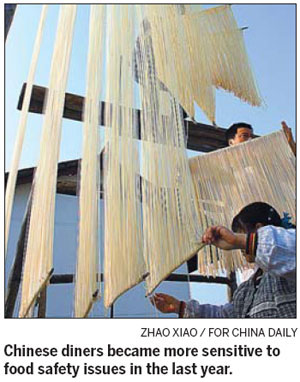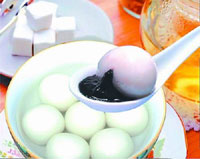Is this safe to eat? That's the question
While a single television documentary, A Bite of China, lifted hearts warmed by thoughts of mother's cooking, several issues brought the Chinese diners back to earth in a year pockmarked by various food safety scares.
In March, there were reports of pesticide residue in tea?leaves, while in April, there were again concerns about milk and worries about cooking oil recycled from the gutters.
Later in the year, it was discovered that some factories had used industrial gelatin in yogurt and "oily fish" was discovered to be masquerading as cod.
Even the favorite traditional fire water of the Chinese was not spared, and unacceptable amounts of plasticizer were found in Chinese baijiu, or white liquor.
"Food safety is a very basic thing in daily life," says Zhang Guichun, a retired restaurant?owner.
"While Western countries are mostly very strict on that, there don't seem to be enough laws and regulations in China concerning that. There must be more attention paid to this and we have a long way to go."
Chong Zhanming, a culinary judge, thinks diners should patronize reputable food and beverage outlets like State-owned restaurants and those with an established reputation.
"Organic?and green food such as meat, egg and?vegetables?cost a lot more than non-organic produce," he says.
"Smaller companies will not switch even when there are food safety issues."
Sometimes economics can be the stronger force, and he says he did not notice a drop in milk sales even when there were renewed concerns about melamine.
"The better-educated will pay more attention, but many consumers will still base their purchases on price."
Ordinary cucumbers can cost 2 yuan ($0.80 cents) for 500 grams, while organic cucumbers cost 5 or 6 yuan. Many will opt for the cheaper vegetable.
"Does food safety issues really raise much attention?" he asks. "Most people just complain and do nothing else."
It is the bigger restaurants that can afford to address food safety issues, he says, while smaller outfits can only operate according to the bottom line.
"To solve the problem, China must go to the source of the problem - the farmers. There is not much restaurants can do about supply sources."
Bian Jiang, secretary general of the China Cuisine Association, says major safety issues have mainly occurred within the food industry, not within the restaurant industry, and most problems occur at the food processing stage.
He says restaurant-goers are now more sophisticated and informed.
"Last year when there was a problem with hotpots, nobody ate hotpots any more," he says. "The restaurant industry had to respond with stricter quality control on the ingredients they source. People should trust the government to do the right thing in this area."
For most restaurants, they will sidestep an ingredient if there is even a suspicion on its safety standards, even though it may raise costs.
China's food and hygiene administration has tightened control on additives and illegal preservatives with strict and frequent checks, according to Bian.
He says food safety is not as much a problem as escalating food costs in the last year. Other operation costs have also skyrocketed, including labor, rental and taxes.
yejun@chinadaily.com.cn
|
|
|
























